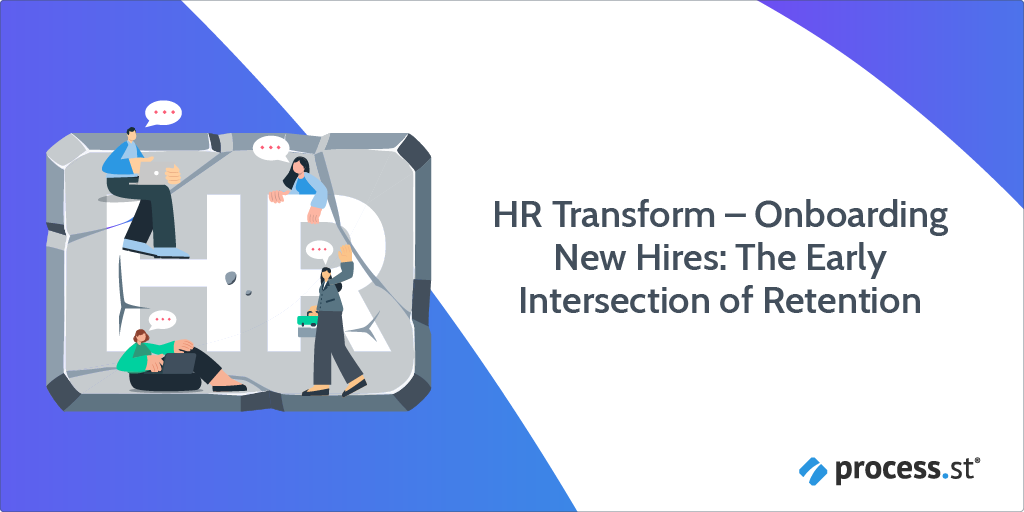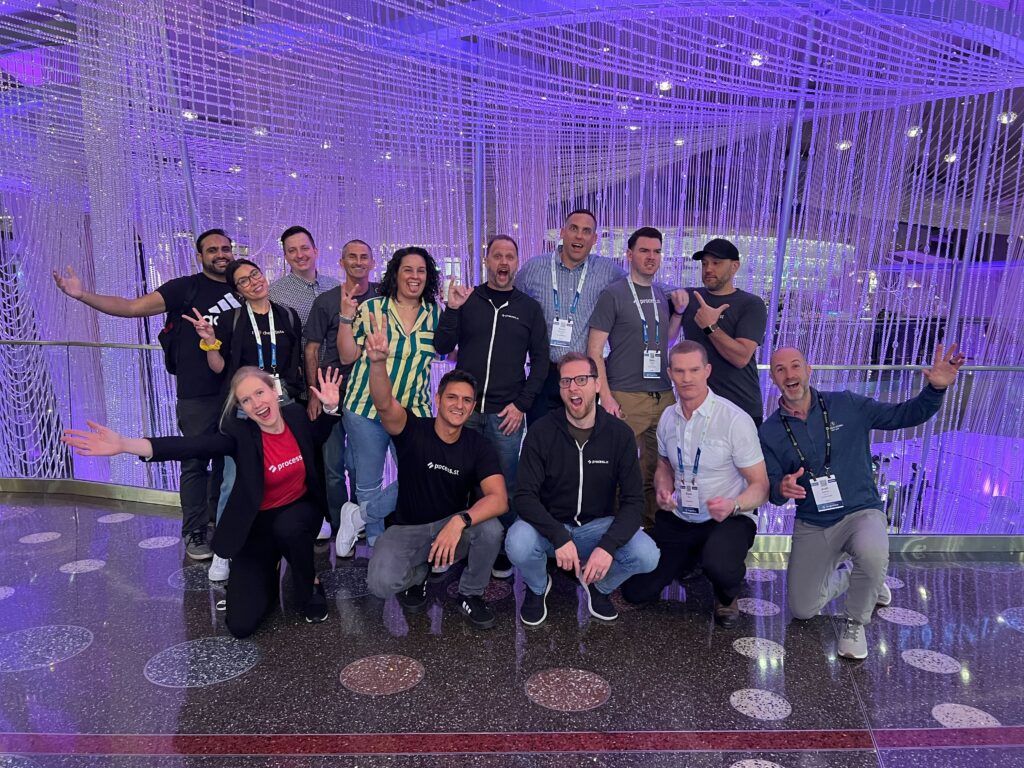
In early 2022 the Process Street team attended HR Transform at the MGM Grand in Las Vegas.
We had a great time hanging out with customers and touting the benefits of process over project management.
Our CEO also got to sit on a thrilling, standing room only, panel about employee onboarding.
The panel was headed up by Kevin Grossman of Talent Board.
The attendees were:
- Vinay Patankar, CEO and Co-founder of Process Street.
- Danielle Monaghan, VP Global Talent at Uber (now Google)
- Greg Russell – Head of Talent at Snapdocs
The focus of the conversation was “prioritizing onboarding to help boost retention“.
Below we pulled out some of the most interested parts of the discussion:
- Preboarding helps retention
- The candidate decides whether to participate in preboarding
- Technology can make onboarding feel personal
- Lack of visibility into onboarding can be costly
- Ensuring retention must be an ongoing process
You can watch the full panel below:
Preboarding helps retention
The panel had concerns preboarding was becoming neglected. They felt this was evident in the growing lack of preboarding and the sudden increase in ghosting.
In terms of retention, Kevin Grossman brought up the topic of ensuring good communication with new hires. Vinay Patankar expounded on this by explaining that his platform, Process Street, focuses on communication during the preboarding phase. Because of this, Vinay felt organizations using Process Street had seen the productivity of their new hires improve right from day one.
“You want people to turn up, you want them to be engaged, and feel part of the culture.”
The candidate decides whether to participate in preboarding
The panel was united in agreement that candidates cannot be made to preboard before their first working day. Responding to the idea of asking new hires to preboard, Vinay Patankar responded that:
“Not every new hire wants to do it; not every new hire has the time to do it.”
– Vinay Patankar
Vinay advised that even though preboarding is optional, some new hires are interested in it. He felt that depending on how much time was available, many are keen to use preboarding to their advantage.
“A lot of the people we hire are interested in moving faster. They care about their careers; they do want to learn more. And so they decide to jump in and do it.”
– Vinay Patankar

Technology can make onboarding feel personal
Considering the use of technology, the panel’s views were in accordance that it had increased the personal touch in onboarding.
Vinay Patankar outlined the theme further by stressing that a platform, such as Process Street, could help HR to understand the challenges faced by the individual. He gave an example of how an executive could enjoy a culture-specific onboarding experience that was also unique and personal.
To add more evidence to his opinion, Vinay disclosed that Process Street had been asked to onboard Slack onto Salesforce. He revealed that Process Street’s technology and optimized workflows had successfully integrated 3000 employees into a new culture.
“If you’re doing a lot of hiring and onboarding, it’s difficult to get personal without leveraging technology in some way.”
– Vinay Patankar
Lack of visibility into onboarding can be costly
After Vinay Patankar’s discourse on incorporating a personal touch in onboarding, he was asked by Kevin Grossman how he helps Process Street customers sustain a quality onboarding experience over time.
Vinay explained that the biggest challenge his customers face is a lack of visibility into the onboarding process. They don’t know how many staff are being onboarded, or which hiring manager they may be waiting on.
Examining his customers’ concerns, Vinay said he has recognized that the lack of visibility stems from the use of several disconnected processes. He described how, instead of using one cohesive Process Street workflow, his customers have previously used emails, spreadsheets, and disconnected Slack messages all strung together. He believes this is what can limit HR’s viewpoint, and it has serious repercussions for those needing long-term quality onboarding. It can also prove to be expensive.
“Not having visibility into how onboarding is performing restricts people from keeping it up to date, and make sure it’s performing at the highest standard.”
– Vinay Patankar

Ensuring retention must be an ongoing process
In its final exchange, the panel reflected on what organizations can do – before a new hire’s first day – to ensure greater retention.
Vinay Patankar was keen to take the lead by stating it was a mistake to expect talent to own the complete process. He felt an organization must work as a single unit to succeed in retaining talented staff.
“I think having the whole organization focus on creating a magical experience for new employees can make a difference.”
– Vinay Patankar
What did you think of HR Transform’s onboarding panel? Particularly in regard to the issues they raised? Please let us know in the comments below!







 Workflows
Workflows Projects
Projects Data Sets
Data Sets Forms
Forms Pages
Pages Automations
Automations Analytics
Analytics Apps
Apps Integrations
Integrations
 Property management
Property management
 Human resources
Human resources
 Customer management
Customer management
 Information technology
Information technology



Mark Jones
Mark Jones is a content writer at Process Street.